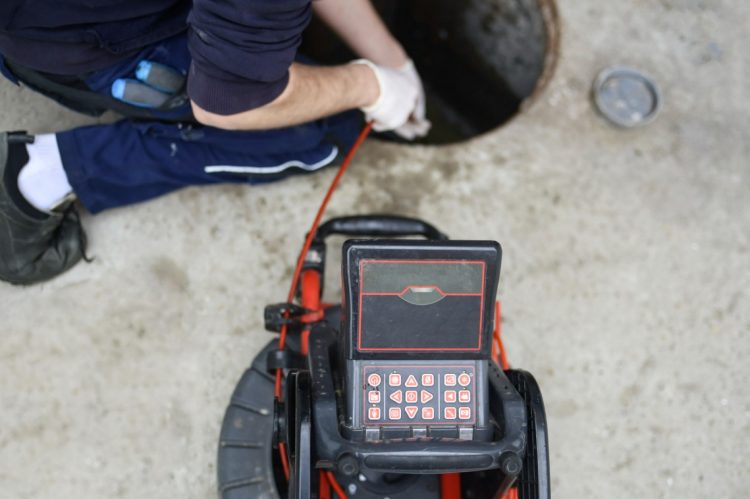How do you find your septic tank? Great question, right?
Septic tanks are crucial components of properties not connected to municipal sewage systems. Proper maintenance and regular inspections of septic systems are essential for their functionality and longevity.
One of the first steps in septic system maintenance is to know the location of your septic tank. Pumping a septic tank is the chief reason for locating your system. While it might seem daunting, finding and locating your septic tank can be straightforward with the proper guidance.
Locating septic systems can be challenging when you’ve always had homes with public sewers. We’ll walk you through the steps to help you find your septic tank accurately.
Check the property records
If you’ve recently moved into a property with a septic system, the property records or blueprints might have information about the septic tank’s location. These documents could give you a general idea of where the tank might be on your property.
Contact the previous owner or professionals
If you have the previous owner’s contact information, they can provide valuable information about the septic tank’s location. Additionally, septic system professionals or plumbers might have been involved in installing or maintaining the system, making them knowledgeable about its whereabouts.
Look for visual clues
Septic tanks often leave subtle visual cues to help you identify their location. Look for areas in your yard that might be slightly raised or have a different texture. The grass might be greener or lusher over the septic tank area due to the nutrient-rich wastewater fertilizing the soil.
Follow the plumbing lines
Start by locating the main plumbing clean-out on your property. This pipe extends vertically from the ground, usually near the house. The tube might have a cap on it. The line connecting this clean-out to your home can give you an idea of where the septic tank might be located, as it generally runs straight.
Check for access points
Septic tanks typically have access points that allow for inspection and maintenance. These access points might be covered with lids made of plastic or concrete. They are usually around 8 to 12 inches in diameter and are often found near the septic tank. Gently probe the ground with a long metal rod to find the edges of the access point.
Consult with septic system professionals
If you’re having difficulty locating your septic tank, it’s best to consult with septic system professionals. They have specialized equipment, such as ground-penetrating radar, that can accurately detect the tank’s position underground. Hiring professionals can save you time and prevent accidental septic system damage.
Use a septic tank locator service
If you still need help locating your septic tank on your own, consider using a septic tank locator service. These professional services specialize in finding underground structures like septic tanks. They utilize advanced technology and tools, such as ground-penetrating radar and electromagnetic sensors, to accurately pinpoint the location of the tank without causing any disruption to your property.
Survey your property
If you have access to a property survey, it can provide valuable information about the layout of your land and the position of underground structures. Look for any survey markings or notations indicating the septic tank’s location.
If you don’t have a study, consider hiring a surveyor to create one.
Observe drain field placement
Septic systems consist of a septic tank and a drain field. The drain field is where wastewater from the tank is released into the soil for natural filtration. While the septic tank itself might be challenging to find, the drain field could provide some clues. The drain field is typically located downhill from the septic tank and can give you a rough idea of the tank’s location.
Explore near water sources
Septic tanks are usually placed away from water sources like wells, streams, and lakes to prevent contamination. Knowing the location of these water sources on your property can help you narrow down the potential areas where your septic tank might be situated.
Trial and error
Finding the septic tank might involve trial and error. If you’ve exhausted all other options, consider probing the ground systematically around the suspected areas. Use a metal rod or a septic tank probe to gently poke the bottom and feel for resistance or hollow space, which could indicate the presence of the tank.
Final thoughts
Knowing the location of your septic tank is vital for its maintenance and upkeep. Regular inspections and timely pumping are essential to prevent costly repairs and maintain the efficiency of your septic system.
Having your septic system pumped should be on a regular schedule of about three to five years, depending on your family size. The cost of septic tank pumping is very reasonable. Following the steps outlined in this guide to find and locate a septic tank, you’ll be well on your way to taking care of this vital home maintenance item.
If the search becomes challenging, don’t hesitate to seek help from septic system experts who specialize in helping you locate a septic tank. This assistance will ensure the longevity and proper functioning of your septic system.
Remember, proper maintenance and care for your septic system contribute to the overall health of your property and the environment.












